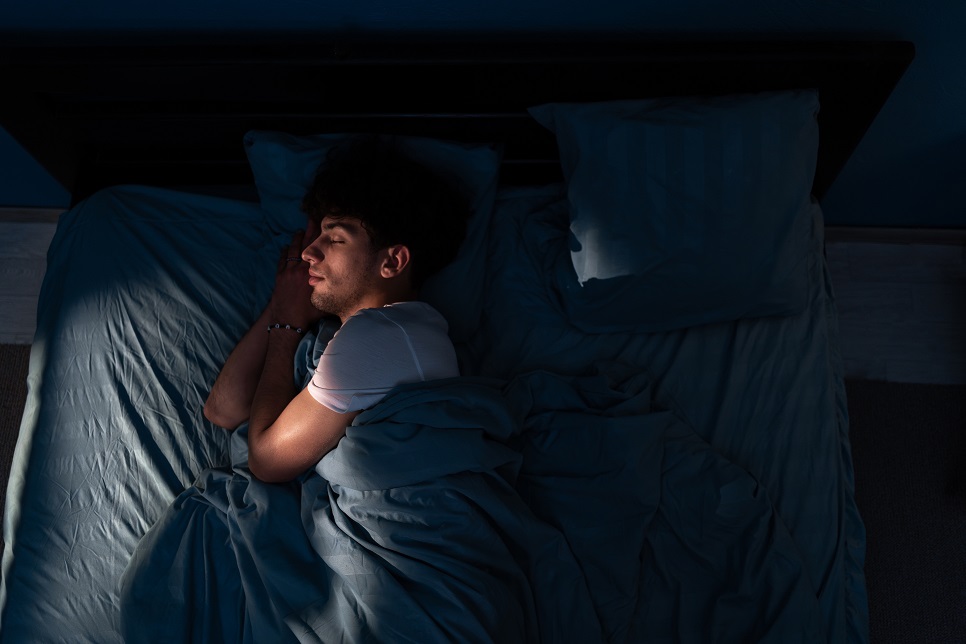Anxiety and sleep disorders maintain a complex, bidirectional relationship where the presence of one often exacerbates the other. With millions worldwide lying awake due to racing thoughts and unease, the impact of anxiety on sleep quality cannot be overstated. This blog post offers insights into practical strategies designed to enhance sleep quality and reduce anxiety levels. By understanding the underlying connections and applying effective coping mechanisms, individuals can enjoy restorative sleep, essential for physical health, emotional balance, and overall well-being.
Understanding Anxiety and Its Impact on Sleep
Anxiety can drastically reduce sleep quality by making it harder to fall asleep and stay asleep throughout the night. Symptoms of anxiety that particularly disrupt sleep include excessive worrying about the past or future, feeling tense or wound up, experiencing a racing heart or heavy breathing, and having intrusive thoughts or fears. These symptoms can initiate a vicious cycle; poor sleep can lead to increased anxiety during the day, which in turn leads to even more difficulty sleeping at night. Understanding this interplay is critical for addressing the root causes of sleep disturbances and formulating a strategy to mitigate anxiety’s impact on sleep.
Other symptoms of anxiety that can disturb sleep include:
- Physical symptoms like a racing heart, rapid breathing, or sweaty palms
- Restlessness and an inability to stay comfortable in bed
- Sudden awakenings from sleep, often accompanied by anxiety or panic
- Difficulty falling asleep due to a fear of nightmares or disturbing dreams
Strategies to Improve Sleep Quality
Establish a Relaxing Bedtime Routine
- Reading a book to mentally shift away from the day’s stresses.
- Listening to a podcast to relax and quiet the mind.
- Do some gentle stretching or yoga to release physical tension.
- Practicing meditation or deep-breathing exercises to slow down racing thoughts and promote physical relaxation.
- Taking a warm bath which can help lower body temperature afterward, signaling the body it’s time for sleep.
Create a Comfortable Sleep Environment
- Maintain a cool room temperature: Ideally, the bedroom should be kept cool as it facilitates the natural drop in body temperature associated with sleep.
- Minimize noise pollution: Consider using white noise machines or earplugs to drown out disruptive sounds. Alternatively, soothing sounds or calm music can also promote relaxation.
- Adjust the lighting: Use blackout curtains or a sleep mask to block out any external light. A dark environment signals to your brain that it’s time to sleep.
- Invest in a comfortable mattress and pillows: Comfort plays a significant role in sleep quality, so ensure your mattress and pillows support your preferred sleeping position and provide adequate comfort.
- Keep electronic devices off: An hour before bedtime, stop using your electronic devices to reduce exposure to sleep-disrupting blue light and electromagnetic fields.
Mindfulness and Relaxation Techniques
Mindfulness and relaxation techniques play a vital role in combating insomnia, especially for those who struggle with anxiety. Integrating mindfulness into your pre-sleep routine can help quiet the mind and alleviate stress, which are common obstacles to falling asleep. Practices such as mindful breathing, where you focus solely on your breath and the sensation of air entering and leaving your body, can significantly reduce anxiety levels. This, in turn, prepares your body for rest, making it easier to drift into sleep.
Another effective method is progressive muscle relaxation, which involves tensing and then relaxing each muscle group in the body. This technique not only aids in releasing physical tension but also promotes mental tranquility. Similarly, guided imagery, where you envision a calm and peaceful setting, can shift your focus away from stressful thoughts and towards a state of relaxation.
Incorporating these mindfulness and relaxation techniques into your nightly routine can not only enhance your ability to fall asleep but also improve the overall quality of your rest. By reducing anxiety and promoting relaxation, mindfulness acts as a powerful tool in the arsenal against insomnia.
Diet and Exercise
The interplay between diet and sleep quality is profound, with nutritional choices having a significant impact on both anxiety levels and sleep health. Consuming balanced meals rich in fruits, vegetables, whole grains, and lean proteins can stabilize blood sugar levels, reducing mood swings and promoting calmer mental states. Particularly, foods high in magnesium, such as leafy greens and nuts, and those containing omega-3 fatty acids, like salmon, have been linked to lower rates of anxiety. Additionally, limiting caffeine and sugar intake, especially in the hours leading up to bedtime, can prevent overstimulation and make it easier to fall asleep.
Parallel to dietary habits, regular exercise can help enhance sleep quality and mitigate anxiety. Engaging in moderate-intensity activities such as walking, yoga, or swimming for at least 30 minutes most days of the week can significantly improve sleep patterns. Exercise boosts the production of endorphins, the body’s natural mood elevators, which can ease feelings of anxiety and stress. Furthermore, physical exertion during exercise can also increase the time spent in deep, restorative stages of sleep, ensuring more restful and uninterrupted rest. Bridging the gap between lifestyle choices and mental health, incorporating mindful dietary habits and consistent exercise regimes offers a holistic approach to combating insomnia and anxiety.
Seeking Professional Help
- Sleep disturbances persist for several weeks despite implementing healthy sleep habits.
- Anxiety or worry significantly interferes with daily activities, including work, school, or relationships.
- Feelings of sadness, depression, or hopelessness accompany sleep problems.
- There is reliance on sleep medications or substances to induce sleep.
- Experiencing physical symptoms such as palpitations, tremors, or unexplained aches, which could be linked to anxiety.
Conclusion
Addressing insomnia and anxiety requires a comprehensive approach that includes both lifestyle modifications and, when necessary, professional intervention. By understanding the link between sleep and mental health, individuals can adopt strategies that not only improve sleep quality but also reduce anxiety levels. If your sleep disturbances persist or your anxiety feels overwhelming despite your best efforts, don’t hesitate to seek support from a healthcare professional.
For additional guidance or support on managing insomnia and anxiety, feel free to reach out. Remember, achieving a healthier mind and body is within your reach, and taking the first step towards seeking help can make all the difference.




